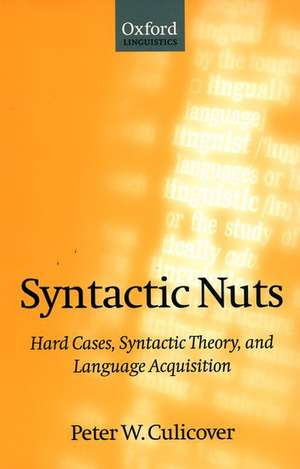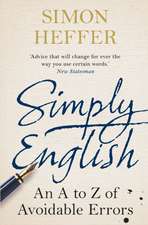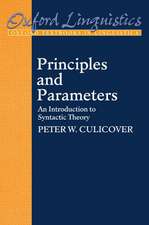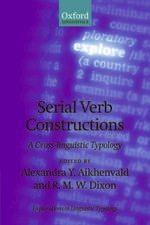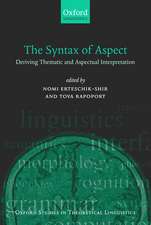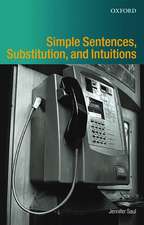Syntactic Nuts: Hard Cases, Syntactic Theory, and Language Acquisition: Foundations of Grammar, cartea 1
Autor Peter W. Culicoveren Limba Engleză Paperback – 2 sep 1999
| Toate formatele și edițiile | Preț | Express |
|---|---|---|
| Paperback (1) | 350.48 lei 31-37 zile | |
| OUP OXFORD – 2 sep 1999 | 350.48 lei 31-37 zile | |
| Hardback (1) | 371.22 lei 31-37 zile | |
| OUP OXFORD – 2 sep 1999 | 371.22 lei 31-37 zile |
Preț: 350.48 lei
Preț vechi: 484.03 lei
-28% Nou
Puncte Express: 526
Preț estimativ în valută:
67.06€ • 70.27$ • 55.44£
67.06€ • 70.27$ • 55.44£
Carte tipărită la comandă
Livrare economică 01-07 aprilie
Preluare comenzi: 021 569.72.76
Specificații
ISBN-13: 9780198700234
ISBN-10: 0198700237
Pagini: 256
Ilustrații: numerous tables, diagrams, and linguistics trees
Dimensiuni: 155 x 232 x 14 mm
Greutate: 0.38 kg
Editura: OUP OXFORD
Colecția OUP Oxford
Seria Foundations of Grammar
Locul publicării:Oxford, United Kingdom
ISBN-10: 0198700237
Pagini: 256
Ilustrații: numerous tables, diagrams, and linguistics trees
Dimensiuni: 155 x 232 x 14 mm
Greutate: 0.38 kg
Editura: OUP OXFORD
Colecția OUP Oxford
Seria Foundations of Grammar
Locul publicării:Oxford, United Kingdom
Recenzii
Culicover addresses the fundamental question of the nature of syntactic universals and the related issue of how syntactic knowledge is acquired by children. His answer challenges many mainstream generative conceptions in taking to a new and higher level the debate over the relative balance between innateness and learning. The fact that his conclusions are supported by dozens of meticulously argued analyses of diverse syntactic phenomena gives his conclusions a credibility that has heretofore been missing in critiques of parametric approaches to universal grammar
The reigning orthodoxy in generative linguistics has it that syntax can be divided into a fully systematic core and an eccentric periphery. The former is claimed to be learnable by virtue of a finite parameterization; the learnability of the latter is rarely discussed, but taken to be relatively haphazard. In this new book, Peter Culicover, one of the early pioneers of learnability theory, has thrown a monkeywrench into the works. He demonstrates that there is in fact no sharp line between core and periphery, that there cannot be a finite parameterization of the core, and that any learning theory capable of accounting for the peculiarities of the periphery can also account for the core's systematicity, given the systematicity of semantics.
Along the way, Culicover provides an entertaining tour through many of the uncharted byways of the peripheral syntax of English and other languages. He grounds his approach in a careful analysis of language learnability, and in so doing urges both syntacticians and neuroscientists toward a more responsible rapprochement in dealing with the complexities of human language.
The reigning orthodoxy in generative linguistics has it that syntax can be divided into a fully systematic core and an eccentric periphery. The former is claimed to be learnable by virtue of a finite parameterization; the learnability of the latter is rarely discussed, but taken to be relatively haphazard. In this new book, Peter Culicover, one of the early pioneers of learnability theory, has thrown a monkeywrench into the works. He demonstrates that there is in fact no sharp line between core and periphery, that there cannot be a finite parameterization of the core, and that any learning theory capable of accounting for the peculiarities of the periphery can also account for the core's systematicity, given the systematicity of semantics.
Along the way, Culicover provides an entertaining tour through many of the uncharted byways of the peripheral syntax of English and other languages. He grounds his approach in a careful analysis of language learnability, and in so doing urges both syntacticians and neuroscientists toward a more responsible rapprochement in dealing with the complexities of human language.
Notă biografică
Peter W. Culicover is currently the Chair of the Department of Linguistics and Director of the Center for Cognitive Science at the Ohio State University.
